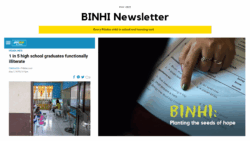


Despite improvements in access to education, the Philippines continues to face a severe learning crisis. According to the World Bank and UNESCO, 91% of Filipino children at late primary age are not proficient in reading-far above regional and global averages. This “learning poverty” means most children cannot read and understand a simple text by age 10, limiting their future learning and opportunities.
The challenge extends to functional literacy. Recent studies show that 1 in 5 Filipino high school graduates is functionally illiterate, unable to perform basic reading and writing tasks essential for daily life. Less than 20% of students meet minimum proficiency levels in reading and math, underscoring the urgent need for effective interventions.
Learning poverty stems from both schooling deprivation (lack of access) and learning deprivation (poor quality education). In the Philippines, 90% of students fail to achieve minimum reading proficiency by the end of primary school, and 5% of primary-aged children remain out of school.
Early intervention is key. Research consistently shows that teaching foundational literacy skills-such as phonemic awareness, letter-sound correspondence, and basic reading comprehension-in the early years dramatically improves outcomes. This is where Binhi’s evidence-based approach makes a difference.
This school year alone, Binhi reached 800 children in Metro Manila and Calamba, teaching Kindergarten and Grade 1 students foundational reading skills through the Science of Reading. The results are compelling: Kindergarten students improved their raw reading scores from 19 to 80, while Grade 1 students increased from 15 to 87. Furthermore, a pilot Kit 2 class of Independent Readers at H. J. Atienza Elementary School achieved a remarkable 93% post-test score, demonstrating the impact of evidence-based teaching.
Over 17 years, Binhi has supported 6,373 children, proving that targeted early literacy programs can break the cycle of learning poverty and functional illiteracy. By equipping children with the skills to read confidently at an early age, Binhi helps ensure they have the foundation to succeed academically and beyond.
Addressing learning poverty is not only an educational priority but a national imperative. It is essential for building human capital, reducing inequality, and achieving the Sustainable Development Goals. Investing in early literacy programs like Binhi’s is a proven way to boosting every Filipino child’s fluency in the English language and fostering their academic growth.
We extend our deepest gratitude to our dedicated donors, including esteemed organizations like ICTSI Foundation, Inc., Jesus V. Del Rosario Foundation, Inc., Metrobank Foundation, Inc., Bouygues Travaux Publics Philippines, Inc., Everest Appliances, Light Rail Manila Corporation, RATP Dev Manila Inc, and numerous generous individual contributors. Their unwavering support has been the cornerstone of our mission to combat early literacy challenges in the Philippines. Through their partnership, we have successfully reached thousands of struggling young readers, equipping them with the foundational reading skills essential for a brighter future. You, too, can play a pivotal role in this transformative journey. Join us in empowering the next generation of Filipino readers and be a part of creating lasting change.
Sources:
1. World Bank-UNESCO Philippines Learning Poverty Brief, April 2024
2. Philippine Institute for Development Studies, SDG4 Study, 2024
3. Philstar, “1 in 5 high school graduates functionally illiterate,” May 2025